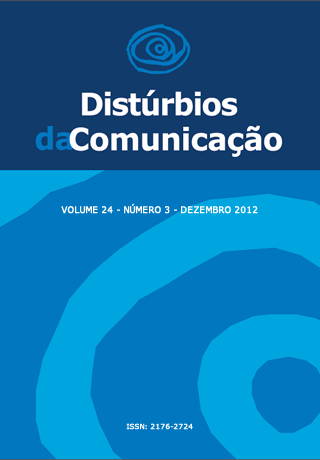Voz do professor: fatores predisponentes para o bem-estar vocal
Palavras-chave:
voz, docentes, fatores de risco.Resumo
Introdução: Muitos estudos, no campo da Fonoaudiologia, têm se preocupado em estudar a voz dos professores, a fim de pensar ações de promoção de saúde e/ou prevenção de alterações vocais. Objetivo: levantar o conhecimento dos professores acerca dos fatores predisponentes para o bem-estar vocal, além de verificar o uso de práticas que favorecem o bem-estar vocal, segundo o tempo de docência. Material e Método: A amostra deste estudo, de tipo transversal, foi constituída por 242 professores da rede pública do município de Jataí-GO, que antes de uma oficina educativa assistiram ao vídeo “O que é bom para o dono é bom para a voz” e preencheram um instrumento com seis questões relacionadas ao bem-estar vocal, hábitos e exercícios vocais. Foram consideradas as respostas de duas questões (informações novas e hábitos praticados) tabuladas e analisadas (qui-quadrado), quanto ao tempo de docência. Resultados: Foram consideradas informações novas e não realizadas pelos professores as que faziam referência a exercícios de aquecimento e desaquecimento vocal; entre os de conhecimento e praticado pelos professores destacaram-se hábitos que interferem na voz (falar alto, falar muito, tossir). Não foi registrada diferença na associação entre o tempo de profissão e a maioria dos aspectos (exceção a prática de “bocejar”). Conclusão: As respostas indicaram que mesmo tendo conhecimento de fatores prejudiciais ao bem-estar vocal, os mesmos permanecem fazendo parte da rotina e da prática dos professores, fato que alerta o fonoaudiólogo na condução de suas ações junto a esse profissional.
Downloads
Métricas
Downloads
Publicado
Edição
Seção
Licença
Copyright (c) 2012 Leslie P. Ferreira, Iolanda A.V. Alves, Adriana A.O. Esteves, Mariana P. Biserra

Este trabalho está licenciado sob uma licença Creative Commons Attribution 4.0 International License.









